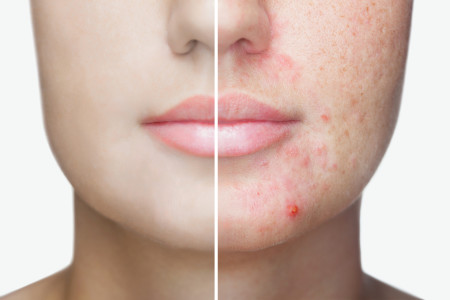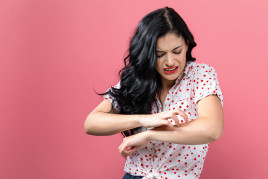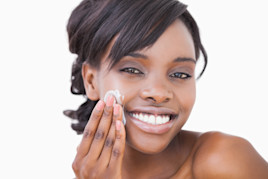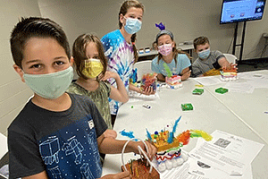Acne: Overview
What is acne?
Acne is a skin condition that can cause one or more of the following:
Blackheads
Whiteheads
Pimples
Acne cysts or nodules (deep, painful breakouts)
Contagious: No
Help is available
Today, virtually everyone who has acne can see clearer skin.

The science behind acne control
Getting acne may be inevitable, but you don’t have to live with it. Thanks to decades of research, virtually everyone can achieve clearer skin.
If you’re looking to get rid of acne, here’s what dermatologists recommend:
Use the right acne treatment for each type of blemish you have. For example, if you have blackheads, you want a treatment that can unclog pores. An acne medication that contains adapalene can unclog your pores and prevent new blackheads. No prescription required.
For deep, painful acne, you need treatment that works on clogged pores, bacteria, inflammation, and excess oil. To get a treatment that can do all this, you need a dermatologist’s help.
Sometimes, it’s difficult to tell what types of breakouts you have. If you’re unsure, a dermatologist can tell you.
No matter what types of acne breakouts you have, research shows the following can help.
Stick to a gentle skin care routine. Do you try to scrub away blemishes and excess oil? Have you ever popped a pimple to get rid of it quickly? While it may seem that you’ll get clearer skin, what you’re doing is irritating your skin.
Years of research have proven that any time you irritate your skin, you can get more breakouts. To clear skin, gentle skin care works best.
You’ll find the skin care that dermatologists recommend at: Acne: Self-care
Use only oil-free skin care products, sunscreen, and makeup. When you have acne, you have clogged pores. To clear acne, you want to unclog those pores.
If you apply anything that contains oil, you’ll likely clog your pores again. Clogged pores can lead to more breakouts.
To avoid clogged pores, use only oil-free products. Any product that’s oil free will have one of these terms on its packaging:
Oil-free
Non-comedogenic
Won’t clog pores
Have patience. Yes, you’ll find products that can make pimples look less noticeable overnight. Any treatment that reduces swelling and redness can do this.
Getting rid of blemishes and preventing new ones, takes time. You need to use the same treatment for 6 to 8 weeks to see improvement.
Why dermatologists recommend treating acne
While acne will eventually go away on its own, dermatologists recommend treating acne for these reasons:
You avoid years of breakouts. Acne can last a long time. Most teenage boys who have acne will continue to have breakouts until they are 20 to 25 years old. A teenage girl can expect her acne to last into her 20s or longer. About 5% of women continue to have acne in their 40s.
You prevent worsening acne. Left untreated, acne can worsen. What starts out as a few pimples can progress to widespread blackheads, whiteheads, and deep, painful pimples. There’s no way to know if this will happen to you. However, you have a greater risk if a close blood relative had deep, painful acne that left permanent acne scars.
If acne becomes severe, it can diminish self-esteem. Many research studies have shown that people who have severe acne tend to have higher rates of depression and anxiety than do people without acne.
You sidestep possible acne scars. All types of acne from blackheads to deep, painful nodules can cause scarring. Acne scars can be permanent. By treating acne early before it worsens, you can prevent these scars.
If you’re wondering how to treat acne before it becomes severe, the first step is to figure how what types of acne blemishes you have. You’ll find pictures and descriptions at: Acne: Signs and symptoms.
Image
Getty Images
References Burgos A, Burch JM. “Acne and acneiform eruptions.” In: Fitzpatrick JE, et al. Dermatology Secrets Plus (5th edition). Elsevier. China, 2016:185-6.
Hendon J. “Acne: A patient’s point of view.” J Am Acad Dermatol 2004;51:S39. Thiboutot DM, Dréno B, et al. “Practical management of acne for clinicians: An international consensus from the Global Alliance to Improve Outcomes in Acne.” J Am Acad Dermatol 2018;78:S1-23.
Zaenglein AL, Pathy AL, et al. “Guidelines of care for the management of acne vulgaris.” J Am Acad Dermatol. 2016;74:945-73.
Zaenglein AL, Thiboutot DM. “Acne vulgaris.” In: Bolognia JL, et al. Dermatology. (fourth edition). Mosby Elsevier, China, 2018:588-92.
 Atopic dermatitis: More FDA-approved treatments
Atopic dermatitis: More FDA-approved treatments
 Biosimilars: 14 FAQs
Biosimilars: 14 FAQs
 How to trim your nails
How to trim your nails
 Relieve uncontrollably itchy skin
Relieve uncontrollably itchy skin
 Fade dark spots
Fade dark spots
 Untreatable razor bumps or acne?
Untreatable razor bumps or acne?
 Tattoo removal
Tattoo removal
 Scar treatment
Scar treatment
 Free materials to help raise skin cancer awareness
Free materials to help raise skin cancer awareness
 Dermatologist-approved lesson plans, activities you can use
Dermatologist-approved lesson plans, activities you can use
 Find a Dermatologist
Find a Dermatologist
 What is a dermatologist?
What is a dermatologist?